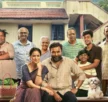Guzaarish – Music Review
- 15th October 2010
- POST IN :MUSIC
Sanjay Leela Bhansali is best known as a director who has made a number of award-winning films, including Hum Dil De Chuke Sanam, Devdas and Black. All three bagged him the IIFA Best Director Award, Filmfare Best Movie Award, and two Zee Cine Awards each (Best Director and Best Film). His last film was Saawariya in 2007, and after a three-year break, this talented director is back with “Guzaarish”, starring Aishwarya Rai Bachchan and Hrithik Roshan. The film follows Ethan (Hrithik Roshan) who decides to go to court to fight for the right to commit suicide after being wheelchair-bound for 14 years. Aishwarya plays his doting and beautiful nurse. The story itself is deep and profound, but that’s nothing new for Bhansali, who has in the past portrayed alcoholism (Devdas) and being blind/deaf (in Black). However, he has taken on a new role for Guzaarish – he has done the music himself. With a whopping ten tracks on the album, we’re treated to a good hour or so of music – and one rather long review from me (!).
The title song starts off with the sound of pouring rain, and the cries of someone’s name. Then KK starts singing in the most heartfelt manner – it’s truly beautiful. It’s a sad song, and KK has really put his all into evoking that emotion. The dialogue in the background is a little hard to make out, and I found it disruptive – I couldn’t wait for KK to start singing again! All in all, a lovely start to the album, and a nice surprise; I wasn’t sure quite what to expect from Bhansali’s debut as a music director.
Kunal Ganjawala’s voice in “Sau Gram Zindagi” is poles apart from his powerful performance in the song Kata Kata from Raavan; here his singing is far mellower. The song itself is reminiscent of “Woh Chand Jaise Ladki” from Devdas, but without as much grandeur in the instrumentation. It switches to a more rock-y feel towards the end with English lyrics (“Life is wonderful”), and Kunal sounds at home with this – there’s something very Bryan Adams-like about his voice in parts during the closing parts of this track.
“Tera Zikr” takes a while to warm up – a full 40 seconds before anything really starts to happen, but once it does, you’ll be glad you waited. I’d never actually heard Shail Hada before this, but his voice is lovely, and Rakesh Pandit (though a total contrast vocally), adds an earthy, classical feel to the track. The melody is primarily classical-based, but Shail Hada’s down-to-earth performance makes it somewhat more contemporary. The swaras (classical notes) rendered by Rakesh Pandit at the end are simply beautiful, as is the shift from the modern beat to a full on tabla-and-harmonium orchestra in the concluding minute. The first time you listen to this track, you’ll most likely be quite surprised at how it ends – judging by the start, I was expecting another Devdas-like, haunting track.
“Saiba” has a very European feel to it (most likely Portugese, as the film is set in Goa), and Vibhavari Joshi makes her debut with this song, after some choral-style vocals from Francois. Her voice is sweet, emotion sincere and diction perfect. The guitar interludes over the slowed-down Mambo-style percussion are soothing; this seems like the perfect song to listen to on a beach, whilst watching the sunset!
KK returns again with “Jaane Kiske Khwaab”, another sad song, but once again, his vocals are sublime. The simple orchestration allows KK to take the reins and he leads us on a musical journey from start to finish. The piano chords are simple, but the guitar and the almost undetectable percussion elevate this song to something far more engaging. While Bhansali has done a good job on this track, it is KK’s poignant performance that steals the show. He may not have attempted any vocal acrobatics, but by simply singing the beautiful lyrics with such fervour, he has given us a moving song that I’ve had on repeat!
I first came across “Udi” in the promos that were released last week, and could not wait to hear the full thing. The first thing that came to mind was that the beat is remarkably similar to that of “Thoodhu Varuma” from Tamil film Kaakha Kaakha, but the Flamenco feel means that the two are pretty hard to compare beyond this. Sunidhi Chauhan has sung with just the right amount of zest and Shail Hada’s background vocals add an extra element to this track. Upbeat and catchy, Udi is a nice change to the slower songs that make up the majority of the album.
Shail Hada takes the mike again for “Keh Na Saku”, and this one brings us back to the typical ballad-style music the rest of the album encompasses. I’d usually expect this sort of song to be handed to someone like Sonu Nigaam, but Shail Hada voice brims with the love the lyrics evoke and his aalaps in the interludes add a classical twist to the beautiful melody.
“Chaand Ki Katori” sung by the classically trained Harshdeep Kaur is a delightfully calm piece with some surprising instrumentation (I think it’s a trumpet in one of the interludes?!) that once again adds an unexpected dimension to the track. The melody, though beautiful, bears a strong resemblance to “Hamesha Tumko Chaha” from Devdas, but again, the orchestration is more modern, making the song altogether more relatable.
The talented KK is back for “Daayein Baayein”, a slightly happier sounding song, supported primarily by guitars. Again KK’s vocals are the focal point in this piece, and Bhansali has appropriately kept the backing instrumentals uncomplicated but fulfilling.
The final track is “Dhundli Dhundli”, sung by the brilliant Shankar Mahadevan. The music has a waltz-like feel to it, and Shankar’s emotive vocals convey the yearning for love expressed in the lyrics. The song is a fitting closing number for this soundtrack.
I applaud Sanjay Leela Bhansali’s work on the soundtrack for Guzaarish; I can’t say there’s a single song on the album that I wouldn’t listen to. The apt choice of vocalists allows these beautiful melodies to transcend onto whole new levels of musical magnificence, and if Bhansali’s picturisation for the songs is anywhere near as dazzling as in past films, we’ll surely be treated to a wealth of visual splendour to elevate these melodious compositions. 4/5.
Kavya Rajagopalan (c) Thamarai.com
- Previous Post
Endhiran – Movie Review






















